How Oura ring impacted my lifestyle
- AlineFlore
- Mar 19, 2023
- 6 min read
Updated: Aug 2, 2023
On Thanksgiving 2022, I decided to gift myself an Oura ring.
I have been working in digital health for the past 12 years and have always been attracted by all those wearables. I chose the ring format because I found it easier to wear. I have been using it for 3 months now and I’m delighted with it. Let me share with you the customer and user experience so you can decide if you want to join the Oura family. (discount code at the bottom)

Acquiring the ring
I received the ring 3 weeks after placing the order online on https://ouraring.com/ . First you receive a kit with plastic rings to help you choose the right size together with a clear tutorial video (If you are based in Barcelona, happy to lend you my kit so you can choose your size without waiting 2-3 weeks to receive the kit) and a few days later you receive the actual ring after placing the order. Mine is the Oura Ring Gen3 Heritage Silver.

You get used to the ring pretty quickly. I don’t feel mine anymore. You can even shower or swim with it. It comes with a special charger and you need to charge it every 3-4 days. They recommend not to let the battery go below 30%, that’s what I have been doing.
In order to have access to the different scores and recommendations you need to subscribe to the membership (€5,99/month). The 1st month is free.
Using the ring
I initially decided to get the ring because I had issues sleeping so I was hoping to improve my sleep using Oura. I took action those past 3 months, made some changes to my daily routine and I can feel it.
It takes a few weeks for the ring to learn from your body and define your baseline, ideal bedtime etc. to give you the best recommendations. You get the most of the ring wearing it during the night and see your personalized scores when you wake up in the morning:

The Oura gives you 3 scores:
The readiness score - it tells you how ready you are to handle the day, how active you should be today or how easy you should take the day. That score is linked to how much and how well you slept, how active we have been the previous day, your resting heart rate during the night, how stressed you are etc For us women, that score can also be affected by our menstrual cycle. Readiness is usually higher in the 1st half of the cycle. As Oura says, the readiness score ‘sums us how well you’ve recovered both mentally and physically and guides you to strike the perfect balance between activity and rest’.
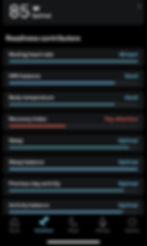
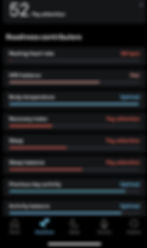
The readiness score and the way you feel when you wake up don't always make sense. I often have great readiness score but I feel groggy. This could actually be linked to the recovery index = how long it takes for the heart rate to stabilize during the night. The later in the night, the more groggy you feel in the morning.
The ring doesn't really take into consideration oversea travels and the impact of jet-lag. It could be a nice addition.
The sleep score - it tells you how well you have slept based on the number of hours you slept, what time you went to bed and got up, the balance between the different sleep phases (REM, light, deep) etc
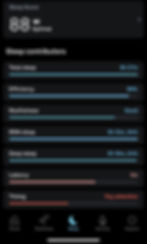

The activity score - it tells you how active you have been during the past day and week based on how active you have been, if you reached your daily goals, the balance of activities (high, medium, low). The ring tracks your activity and asks you to validate those activities. You can also manually add activities.
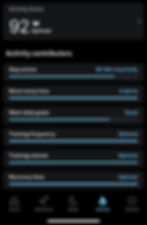
For each subsection of the scores, you will get an indication of how well you are doing: blue = optimal/good, orange = fair, red = pay attention and it gives you some ideas of what you could do when you are orange or red.
You can also follow:
Your heart rate 24/7
Your temperature trend during the month - very useful to follow your monthly cycles and know when your periods or ovulation are coming. The temperature also indicates when you are getting sick and when you are recovered.
Your ideal bedtime. After a few weeks, the app will recommend the ideal bedtime for you based on your circadian cycle. It’s usually a one hour window.
Body clock. Since mid March, oura introduced the body clock which indicates your chronotype and how aligned you are with it. The more aligned you are with your natural chronotype, the better.

When you get your Oura, spend time exploring the app. There are explanations for each part of the app either through the app itself or redirecting to the Oura website. It really helps to get a good understanding of the different data and how you can take action. You will get familiar with them over the weeks.

You have the option to choose your focus area, meaning the most important thing for you right now. The information on the home screen will be displayed based on your focus area. Mine is 'be productive and energetic' for instance, so the app shows me my inactive time, HRV trend and sleep efficiency.
The app also includes a 'Explore' session with mediation and breathing sessions as well as education materials explaining the different scores as well as information on topics such a sleep stages, meal timing, caffeine, etc
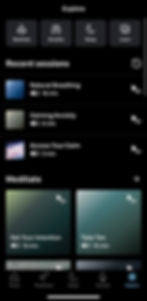
How Oura impacted me?
As I mentioned above, the app will give you some recommendations on what to do to improve your scores. You have to do tests based on those recommendations and see what works for you and the impact on your health and scores. You can add tags to track your routine. For instance if you had a drinking night, if you were on a red-eye flight, etc that will help you understand your body better and how things are affecting your health.
In my case for instance, I adapted my sleep routine by having dinner earlier to make sure my body had enough time to digest (I suspect my digestive system is slower than the average), I stopped playing games like Candy Crush before going to bed, I turned blue screen option on my tablet and phone, etc I’m not sure how efficient those changes were as some days even applying them, my sleep is not optimal but it was a good trigger to make those healthy changes and stop my video game addiction.
I also stopped drinking alcohol (not that I was drinking a lot before) as I noticed that alcohol was plumbing my HRV.
One of the biomarkers that Oura measures at night is the HRV (heart rate variability). That score caused me a lot of stress when I started using the Oura because mine is very low and according to Dr Google, having such a low score is a sign of being (very) unhealthy.
I investigated this HRV topic and spoke with healthcare professionals and scientific friends who reassured me quite a lot. It seems like HRV can be linked to genetics and some people have it naturally low. People with anxiety or chronic stress also have lower HRV. That Facebook group was also very useful: https://www.facebook.com/groups/2028069073980403 You realize that you are not alone and that other users have the same questions as you. One important information highlighted by Oura: HRV is very personal so don’t compare yourself to others! And as Oura says, your HRV baseline could be anywhere below 20 to above 200.
The activity score is interesting as well: I felt I was actually being less active as the ring kept telling me to have more rest and slow down so my body had time to recuperate. The app will set up an activity goal based on your readiness score. Days when you are not feeling well, you can activate rest mode, which will stop tracking your activity. If your readiness score is low, the app will suggest to turn on rest mode too.
After 3 months using the ring, my sleep has improved, I got used to my new healthy routine and I even lost a few kilos without really changing my diet. I feel empowered using the ring and I have a better understanding of what works for my own body.
Let me know if you have questions about the Oura ring in the comments. I will be happy to reply.
DM me if you want to get a discount code towards your Oura ring (usually 40 euros).



